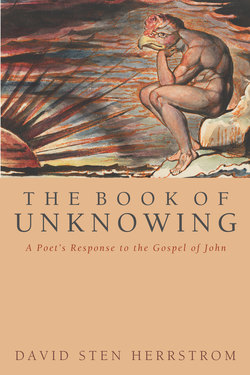Читать книгу The Book of Unknowing - David S. Herrstrom - Страница 12
На сайте Литреса книга снята с продажи.
Body
Оглавление1. Perhaps Thomas is an extremist of the senses. Certainly his experiment is radical. Yet Jesus invites it.
2. Even reeling from the scene, we can’t avoid the conviction that Thomas’ act supports Jesus’ larger program perfectly. Not one given to theological abstraction here but centered in the physical body. Jesus declares boldly and unequivocally: “He that eats my flesh, and drinks my blood, dwells in me, and I in him” (6:56).
3. No punches pulled. Jesus insists on the literal, however much we squirm and want to retreat into the metaphoric.
4. Just as he invited Thomas to touch him, to sink his finger in a bloody wound, he invites us to eat. A radical but not surprising request, for eating is the extreme of touch.
5. What space is to us, the body is to John. The wide open spaces of America have always been the dwelling place of hope and freedom. For John their dwelling place must be the body. Everlasting life raises the stakes.
6. John wants not merely freedom for the body but freedom of the body. Not a body transformed by a place, but a transformed body subject no longer to the locus of mortality.
7. And this new body born from a new kind of womb is the center of John’s book. His real subject is the body not belief. Only in the body is freedom from death, the hope of immortality.
8. First and last this is the body of Jesus. Thomas’ experiment is pivotal because he acts out John’s desire to put on this new body.
9. John ultimately dispels the anxiety of death by exchanging his old mortal body for the new one that Jesus offers. And within this arena of transformation, John’s book unfolds.
10. John’s Jesus is obsessed with living abundantly, living beyond the life assumed to be our common lot. So great is his certainty that he is willing to sacrifice his present body for a promised body.
11. Thus John orchestrates a radical redefinition of the body. He begins with flesh.
12. John probes the double nature of flesh as sacrifice and sustenance, the lamb as well as bread, redefining them both. The body is also breath, and John redefines the wind that blows through our body carrying its chorus of voices.
13. He must effect a radical change in our accustomed vocabulary. The whole of John’s book is dedicated to precisely this change. From the outset he renames the essentials of everyday life—bread and water.
14. As Jesus gives them a new context and resonance, they gradually become for his listeners new things in the world. It is a brilliant strategy because as we come to use his new names, we internalize Jesus’ claims for “Eternal life.” Jesus’ dying into a living life, that is, exemplified in the transformation of his own body.
15. Material becomes immaterial becomes both and neither, an everlasting body that passes through solid walls but acquiesces to the touch of a human hand. Thus by the life he portrays, John redefines the body as immortal.
16. Jesus is not simply the model of this body, but is in himself the body shared, inviting his followers to partake of it (6:53). In the act of eating is achieved total identity with Jesus. By this John does not merely put on the body of Jesus, like Thomas, but becomes the body of Jesus.
17. Mortal/immortal, all is contained in this new body. In Jesus is identified the real. “The Word was made flesh” (1:14), encompassing the cosmos as well as all the words of John’s book.
18. Thus in the body of Jesus exists the entire world—animal (lamb), vegetable (bread), and mineral (temple). Jesus declares himself to be each of these. Self-generated and generating, he comprises all the elements of the world, including language itself, outside of whom nothing can be known.
19. All words are one word, and that one word is new. John’s book is the dictionary of these words that are the one Word.
20. The Jews assumed that “sacrifice” was their own word, but by becoming the sacrificial lamb Jesus makes it his own. The disciples and the people assumed that they understood the word “bread,” and the Samaritan woman the word “water,” but they all discover differently. Nicodemus knew the word “wind,” but Jesus renames it for him.
21. Going against the grain, Jesus’ stark invitation to eat his bread-flesh remains. John forces a redefinition that effects transformation. And thereby accomplishes his ultimate aim that the “you” in his fervent wish “that you might believe,” his listeners and readers, be transformed.
